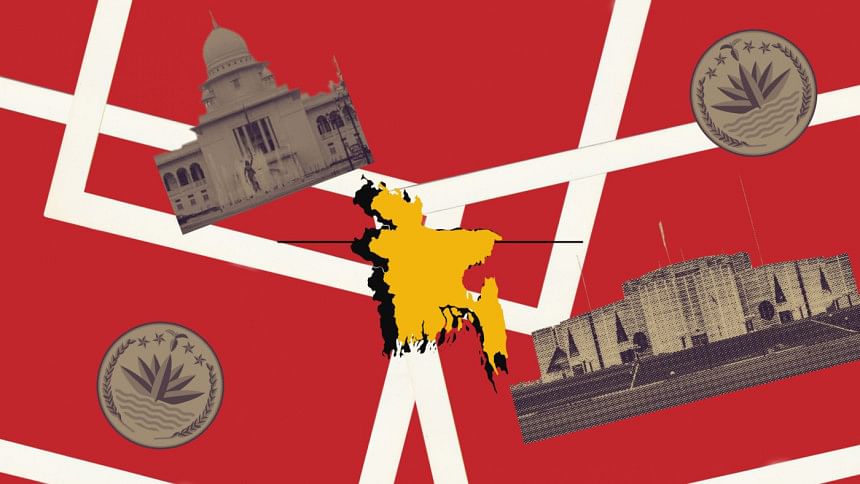A pathway to transformative governance

The interim government comes with a mandate to ensure a peaceful transition to democracy, but its full scope is undefined, and a timetable is yet to be determined. Expectations are running high, and so are fears. As the Arab Spring has shown, failure could set back the struggle for democracy for decades to come.
I see a window of opportunity to craft a platform for transformative governance, grounded in democratic values and human rights principles. But that window will not last long. Among the many issues that demand the urgent attention of the interim government, it must select and prioritise a few critical reforms that are truly vital for sustaining democracy in the long run, that can be achieved in a short time and can be embedded in such a way that they will outlive this government.
The selection, prioritisation and delivery of those reforms will determine whether this moment in our country's history is a new dawn or a false one.
I believe early action in six key areas is essential.
First is the early restoration of law and order. There continues to be reports of violence, arson and looting, targeting supporters of the previous regime and members of the Hindu community. The political nature of these attacks is evident. The interim government must make it clear that not only does it have zero tolerance for political vendettas or scapegoating of minorities, but that all political parties must proactively reign in their goons or face political and legal consequences.
The interim government should think outside the box when it comes to policing. The discredited and demoralised police have walked out. Within hours of the police going on "strike", well-organised groups of students and volunteers took to guarding neighbourhoods and managing the city traffic in Dhaka with remarkable skill, politeness and diligence. This could well be the beginning of a new community-based policing system that this country badly needs.
Second is accountability for human rights violations—not to be done forty years down the road but here and now. The interim government should initiate a credible and transparent accountability process, in line with internationally recognised standards and with international assistance, into the massive human rights violations in recent weeks and past years. The government should take up the offer of assistance from the United Nations High Commissioner for Human Rightsand ask for an international commission of inquiry.
The international nature of the inquiry will be vital for the credibility of the process at home and abroad. By taking the bold step of inviting an investigation, supported by the United Nations, into Bangladesh's human rights obligations which are underpinned by international treaties, this interim government will set an important precedent on accountability and respect for the rule of law which future governments cannot ignore easily.
Third is to strengthen the right to freedom of expression and the role of independent news media. The government should immediately repeal the Cyber Security Act, the law on criminal libel and the Information and Communication Technology Act, which were used by the previous government to gag the media, prosecute and punish journalists and human rights defenders, and disrupt the internet.
The previous government weaponised the judicial system to throttle dissent and silence journalists. Multiple charges were brought against scores of editors and journalists and left hanging over their heads for years, inducing a culture of fear and self-censorship. Criminal charges against all journalists and editors must be dismissed immediately. Journalism is not a crime.
Fourth is judicial reform. Parliament has been disbanded, the executive has been replaced, now the judiciary has resigned under pressure from the student-led movement. Root and branch reform of the judiciary is long overdue, and essential to gain the trust and confidence of the public as well as investors. This government should undertake a process of fundamental reforms, especially at the highest echelons of the judiciary, to ensure the independence, impartiality and competence of the judiciary and commitment from its highest echelons to its rank and file to upholding fairness, human rights, and the rule of law.
At a minimum, the interim government must develop an effective judicial mechanism to resolve electoral disputes. As Director-General of the International Development Law Organization, I played a part in the reform of Kenya's Supreme Court, following the adoption of a new constitution in 2010 after the bloodiest post-electoral violence in the history of that country. The reform of the supreme court and the exemplary leadership of successive chief justices have created such public trust that there has been no large-scale political violence in Kenya since then. When the opposition challenged the re-election of then sitting President Uhuru Kenyatta in 2017, the court ordered a re-run which the president accepted. When the court certified that he had won the re-run, the leader of the opposition accepted the court's decision without protest.
Fifth, democratic elections. The interim government will no doubt take many measures to create an enabling environment for free, fair, inclusive and credible elections. I strongly urge a reinstatement of the rule on the caretaker government arrangement for conducting future elections. Remember the Right to Information decree introduced by the caretaker administration in 2008 which the incoming government did not dare to reverse? This government should put the same kind of political capital to embed the caretaker arrangement.
My final point is about bringing a profound change in the political culture. The people of this country, especially the youth, are fed up with self-serving, corrupt and violent politics and politicians. They want a new type of politics that cares about ordinary people, that values equality, opportunity and justice.
The interim government, the student-led movement and all who support it must work to create a broad-based national movement with new ideas, leaders and innovative political structures that are representative of the gender, age, ethnic, religious and socio-economic diversity of our country and committed to create a rights-respecting, just and democratic society. We must have a truly alternative choice at the next elections.
Irene Khan is UN special rapporteur on freedom of opinion and expression and former secretary general of Amnesty International.
Views expressed in this article are the author's own as a citizen of Bangladesh.
Follow The Daily Star Opinion on Facebook for the latest opinions, commentaries and analyses by experts and professionals. To contribute your article or letter to The Daily Star Opinion, see our guidelines for submission.

 For all latest news, follow The Daily Star's Google News channel.
For all latest news, follow The Daily Star's Google News channel. 









Comments